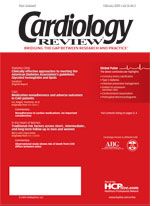Publication
Article
Atrial fibrillation after bypass surgery
A 75-year-old white man was scheduled for coronary artery bypass graft (CABG) surgery for three-vessel disease. He had hypertension, non—insulin-dependent diabetes mellitus, stable angina, a preoperative weight of 250 pounds, and a height of 5’ 8”. Preoperative medications included metoprolol (Lopressor Toprol), nitrates, and glyburide (Diabeta, Micronase). Preoperative left ventricular function by ventriculography was 50%.
The patient underwent three-vessel CABG surgery on cardiopulmonary bypass. Surgery was uneventful, and normal sinus rhythm was achieved with only one attempt at defibrillation after completion of the distal anastomoses. The patient was separated from cardiopulmonary bypass without inotropes and was taken to the intensive care unit (ICU) in stable condition.
Postoperatively, the patient remained stable and was transferred to the floor on postoperative day 1. On the second postoperative day, he developed a tachycardia associated with diaphoresis. Electrocardiographic telemetry showed a narrow complex tachycardia, with a heart rate of 130 beats per minute. Metoprolol, 5 mg intravenously, was administered, and an irregularly irregular rhythm consistent with atrial fibrillation was evident. The patient was returned to the ICU, with paroxysmal atrial fibrillation in the next few days, which required digitalization and ventricular rate control with a beta-adrenergic blocking agent. The patient was stable by postoperative day 7, with no recurrence of atrial fibrillation. He was discharged in good condition.
Preoperatively, given the patient’s history, how would you advise this patient of his risk of postoperative atrial fibrillation? Is there any additional information that could be obtained, either before or during surgery, by way of monitoring that might further stratify his risk of postoperative atrial fibrillation? Are prophylactic antiarrhythmic medications indicated for this patient? If so, which medication is indicated?
Based on results from our study, this patient is at high risk for developing postoperative atrial fibrillation, given his age, body size, and race. Intraoperatively, transesophageal echocardiography may provide additional information on his left atrial dimension. An enlarged left atrium will further increase his risk of postoperative atrial fibrillation. After cardiopulmonary bypass, if the patient develops further evidence of a reduction in left atrial function and diastolic filling abnormalities, then institution of prophylactic antiarrhythmic medication may be indicated. Amiodarone (Cordarone) and rate control with beta blocking agents may be considered. Medications that may optimize atrial loading conditions, such as angiotensin-converting enzyme inhibitors and diuretics, may also prove to be worthwhile, but further research is necessary to show their efficacy in the treatment of postoperative atrial fibrillation.
